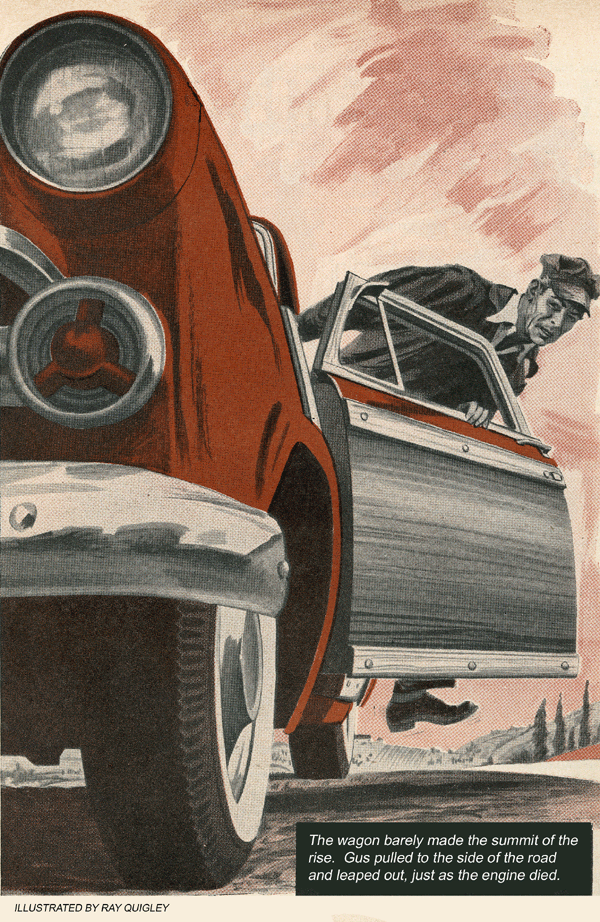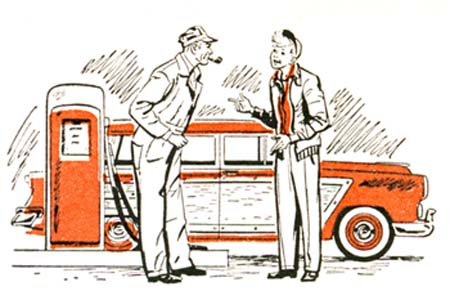April 1955
GUS FIXES A RELUCTANT WAGON
by Martin Bunn
For the kids sake,
Gus was bound he'd cure
the mixed-up car
that purred like a kitten
until it warmed up-then quit cold.

When Barney Overholtz drove his 1952 station wagon into Gus Wilson's Model Garage, he was about as downcast-looking as anybody Gus had seen in a good while.
"How are you, Barney?" Gus greeted him. "I haven't seen much of you lately. Where have you been keeping yourself?"
"I've been pretty busy," Barney told him, "since I promoted myself from the paper route to delivering groceries after school and Saturdays for Eric Watt's market."
"That's how you tell it," Gus went on, poking the youngster playfully in the ribs. "The way I hear it is that you are spending considerable time chauffeuring Sadie Plevens around."
"Well, maybe I am," Barney admitted flushing to the roots of his brown hair.
"But I won't be able to much more. The way this car eats gas, I'll go broke and have to give up truckin'. Sometimes I wish I had my old 1941 Ford back again."
"That's peculiar," Gus said. "This six-cylinder job should give good mileage. Should get around 20."
"It should," Barney complained. "but it doesn't. I'm lucky to get 12. And sometimes she almost won't run."
Barney Does His Own Fixing
Gus didn't ask the young fellow why he hadn't brought the car in sooner. He knew. Barney had started his newspaper route with a third-hand 1941 Ford, with a crankcase full of water. Gus had managed to stop the water leak into the crankcase, but the old car had finally become worn out, and Barney had been forced to buy a newer vehicle for his new job. You couldn't, Gus thought now, help support the old folks, buy a good car, take out a girl, and at the same time pay garage bills. Barney was inclined to do his own fixing. Gus sensed that he must have been pretty desperate to bring the car in now.
"We'll take a look at it," Gus told him, lifting the hood.
"I worked on it some myself," Barney said, "but it didn't seem to do much good. The only thing I found wrong was that the felt in the air cleaner was sort of charred and burnt. I put in a new felt—maybe some of the old one got stuck in the carburetor."
"Maybe it did," Gus said, perking up his ears. "I wonder how that felt got charred—must have ignited some time from a backfire, before you got the car."
Gus started the motor, idled it, gunned it, shut it off.
"Sounds all right to me," he commented, wheeling over his tool kit.
Gus Makes an All-Around Check
He removed the air cleaner, washed out the felt in solvent, cleaned the bowl and added fresh oil. He pulled the carburetor and cleaned it, carefully checking passages and screens, float setting. Replacing the carburetor, he snapped off the distributor cap, closed the points by rocking the car in gear, turned on the ignition switch, held the high-tension wire from the coil near the block, snapped the points with his thumb.
Noting the strong spark, Gus replaced rotor, cap and wire. He removed cleaned, tested and set the plugs, made a compression test on all cylinders. Again he started the motor, listened to it with cocked ear.
"Sounds pretty sweet to me, Barney," Gus told the youngster. "Full compression on all cylinders—good shape all around. Sounds like she's timed right, but we'd better check. Slow spark could cost you gas."
Gus cleaned the timing mark on the vibration damper, hooked up his strobe light, finding the timing only a hair off. He set the spark on the mark, made a routine check for loose wires, worn spots, battery terminals and ground.
"Let's drive her around the block, Barney," he said.
The car performed perfectly, and Gus turned it over to the youngster at the garage, charging him the smallest amount he dared without making him feel that he was getting special favors.
Stan Hicks, Gus's young helper, knowing his boss's weakness for helping out youngsters just starting out in life, smiled to himself.
"If all our customers were kids, Gus," Stan said, "we'd be broke in a month. What was wrong with the car, anyway?"
"Hanged if I know," Gus said. "I never did find anything really wrong. Maybe he had some charred felt in the carburetor passages. I might have failed to see it when I blew it out."
Barney Calls for Help
Gus felt satisfied that he had given the car a thorough check, and was considerably surprised when Barney drove in the next day.
"She wouldn't take it this morning, Gus," he said. "Pa had to break out his car and deliver my groceries. And was he mad!"
"How'd the car act?" Gus asked.
"It ran fine at first," Barney said, "and then when it got hot — it was a warm day yesterday, you know — it began to miss. The farther I went the worse it got. Wouldn't pull the hat off your head. I phoned Pa from the Nolan farm and he came and picked me up. After we got the orders delivered we came back for my car. It ran all right then, but I brought it right in to you."
"Great!" Gus said, but he didn't feel that way. A stubborn look came into his eyes as he rolled up his tool kit and started the motor.
It seemed to Gus that he had never heard a motor that ticked them off better. But for the moment he was disinclined to trust his highly trained ear. He abandoned his usual method of working, and began using his motor analyzer and test panel.
What, he asked himself, would cause a motor to miss when real warm, and yet work perfectly when cold or ordinarily warm? Vapor lock? Too hot a type of plug? Faulty coil or condenser? Some sort of resistance building up in the ignition system? Loose connection or poor ground?
Gus went to work systematically. He tested the coil and condenser, installed new points, making certain that there were no hidden jokers in the distributor, such as a movable breaker point striking a screw head, or faulty insulation or ground. He checked valve setting, cam angle, wiring, connections. The further he went the more he became convinced that there was nothing whatever wrong with Barney Overholtz' car. Finally he buckled up everything and lowered the hood.
"Now," he said grimly to Barney, "Let's really road-test her."
Twenty Miles and All’s Well
It was a beautiful, mild spring day as they drove out of town. The morning sun was fast warming the air. Gus nursed the car along, varying speeds, hitting this hill fast, that one at slow pull, alert to the hum of the motor, the throaty song of the exhaust. They drove 10 miles, 20.
"I guess you fixed it all right," Barney commented. "I knew you would."
"I hope so," Gus said, trying to sound confident.
Engine Sings a New Song
They came to the long, climbing slope of the Big Hill road, and they were nearly to the top when Gus sensed a new sound developing in the motor. It wasn't something that he could instantly put his finger on, yet it seemed to him that he should be able to. It was a familiar yet momentarily elusive change in motor tone.
"Something wrong, Gus?" Barney asked quickly.
The words had hardly left his mouth when the car slowed seemed to lose its power. Gus jiggled the throttle, watching developments warily. The motor began to miss and stagger, and the wagon barely made the summit of the rise. Gus pulled to the side of the road and leaped out, just as the engine gave one last gasp and died.
The burly mechanic looked ruefully at Barney, became very preoccupied with fumbling his pipe from his pocket tamping it with tobacco with a horny thumb. He lit a match on the seat of his overalls-puffed reflectively.
"Nice view of the valley from here, isn't it?" he remarked.
Gus Takes Time Out
He seemed to be completely absorbed with the view, yet his mind was racing. He'd be hornswoggled, he told himself, if he'd lift that hood and make any more of a fool of himself before this kid, until he had some idea of what he was looking for. He'd checked and rechecked everything that could possibly cause trouble. There was nothing he could do but putter around like a jay bird, until he got a new slant on this deal.
Gus chewed thoughtfully on his pipe. That change in motor tone before the engine started missing had been as familiar to him as the sound of running water . . . What was it, anyway? By golly it had sounded as though the motor was choked.
Quickly Gus removed the air cleaner and peered into the carburetor's throat. The choke was wide open. Gus checked it with his fingers-here was no doubt about it. What now? Air cleaner? But he had cleaned and checked that thoroughly. Still the suspicion of a choked motor, once firmly established, persisted in Gus's mind. He removed the top of the air cleaner, lifted out the felt. The piece of felt seemed somehow off base, too limp and floppy.
"Where did you get this felt, Barney?" Gus asked.
"I cut it out myself," Barney said, "from a piece we had around."
Air Cleaner Gets a Strangle Hold
"Ah!" Gus's exclamation held a note of disgust. "I should have noticed this when I cleaned the air cleaner," he declared.
"Guess I'm getting addled in my old age.
But both times you drove into my shop, you'd driven only a few blocks. The motor was still fairly cool, the felt fairly stiff. When this felt gets really warm it gets limp. It sags down and shuts off the air from your motor. No wonder the motor sounded choked to me and you got such poor gas mileage. We'll put in a factory-spec felt, and your troubles are over, Barney."
They were over. A week later Barney drove into the garage and announced no trouble. Moreover, he said with a happy grin, the station wagon was doing about 21 miles to the gallon.
"Goes to show," Gus told Stan Hicks, "that a man can pinch pennies in the wrong places. It doesn't pay. It didn't pay for Barney Overholtz, and that's for sure."
"Yeah," Stan Hicks said disgustedly.
"You really made him pay, didn't you. Two dollars, wasn't it?"
END
